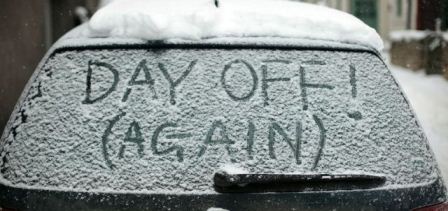SNOW DAY! Do you have to pay exempt employees?

Even here in Hampton Roads, where we rarely see much snow at all, we have had to confront the various issues that can arise in the workplace during a snowstorm. Do we close the office? What do we do if we remain open, yet an employee doesn’t come in? The Department of Labor issued an opinion letter in 2005 (FLSA2005-46) addressing an employer’s question regarding deductions from pay in the event of an employee’s absence due to adverse weather conditions. Basically, if an employee is exempt under the Fair Labor Standards Act (“FLSA”) and the employer makes the decision to close the workplace because of a snowstorm, that exempt employee must be paid for the full week, without any deductions. However, if an exempt employee does not come into work because of adverse weather conditions even though the workplace remains open, a deduction to his or her salary can be taken, but only if he or she is absent for a full day.
Federal regulations provide as follows:
…an exempt employee must receive the full salary for any week in which the employee performs any work without regard to the number of days or hours worked. Exempt employees need not be paid for any workweek in which they perform no work. An employee is not paid on a salary basis if deductions from the employee’s predetermined compensation are made for absences occasioned by the employer or by the operating requirements of the business. If any employee is ready, willing and able to work, deductions may not be made for time when work is not available.
29 C.F.R. § 541.602(a). Therefore, if an employer takes an improper deduction from an otherwise exempt employee, it risks the employee no longer satisfying the salary basis test and thus no longer exempt under the FLSA.
Deductions can be made when an exempt employee is absent for one or more full days for personal reasons, other than sickness or disability. 29 C.F.R. § 541.602(b). The regulations specifically explain that if an exempt employee is absent for two days to handle personal affairs and a deduction for these two full days is taken, the employee’s salaried (and thus exempt) status is not affected. However, if an exempt employee is absent for a day and a half because of personal reasons, the employer is only able to deduct for the full day absence. Id.
According to the Department of Labor, an absence due to adverse weather conditions, including an absence due to transportation difficulties during a snowstorm even though the employer is open, is considered an absence for personal reasons. In this situation, the employer can deduct one full day’s absence from the exempt employee’s pay. However, the regulations do not permit deductions for less than a full day’s pay. So if the exempt employee simply came in at noon one day because of snow, the employer could not deduct for that half day absence without putting the exemption in jeopardy.
If the employer closes the workplace for a few days because of a snowstorm or other weather-related emergency, this would constitute an absence occasioned by the employer or by the operating requirements of the business, and thus, exempt employees would still need to be paid for the entire workweek.

